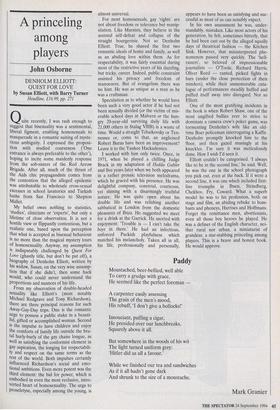A princeling among players
John Osborne
DENHOLM ELLIOTT: QUEST FOR LOVE by Susan Elliott, with Barry Turner Headline, £16.99, pp. 271 Quite recently, I was rash enough to suggest that bisexuality was a sentimental, liberal figment, enabling homosexuals to masquerade in a romantic suiting of myste- rious ambiguity. I expressed the proposi- tion with studied coarseness (`One entrance is always preferable to the other'), hoping to incite some maidenly response from the sob-sisters of the Red Arrow Brigade. After all, much of the thrust of the Aids chic propagandists comes from the contention that the alleged epidemic was attributable to wholesale cross-sexual excesses in school lavatories and Turkish baths from San Francisco to Shepton Mallet.
My belief owes nothing to statistics, `studies', clinicians or 'experts', but only a lifetime of close observation. It is not a hostile view or flippantly contentious, but a realistic one, based upon the perception that what is accepted as bisexual behaviour is no more than the magical mystery tours of homosexuality. Anyway, my assumption is indisputably challenged by Quest For Love (ghastly title, but don't be put off), a biography of Denholm Elliott, written by his widow, Susan, on the very wise assump- tion that if she didn't, then some hack would, who could never understand the proportions and nuances of his life.
From my observation of double-headed sexuality like Elliott's (most notably Michael Redgrave and Tony Richardson), there are three principal reasons for such Away-Gay-Day trips. One is the romantic urge to possess a public stake in a beauti- ful, gifted or accomplished woman. Second is the impulse to have children and enjoy the comforts of family life outside the bru- tal hurly-burly of the gay chaise longue, as well as satisfying the conformist element in gay aspiration, the longing for respectabili- ty and respect on the same terms as the test of the world. Both impulses certainly influenced Richardson's social and emo- tional ambitions. Even more potent was the third element: the bid for power, which is embodied in even the most reclusive, intro- verted heart of homosexuality. The urge to proseletyse, especially among the young, is almost universal.
For most homosexuals, gay 'rights' are not about freedom or tolerance but manip- ulation. Like Marxists, they believe in the assisted self-defeat and collapse of the straight bourgeoisie. Not so Denholm Elliott. True, he shared the first two romantic ideals of home and family, as well as an abiding love within them. As for respectability, it was fairly essential during most of the restrictive years of his dazzling, but tricky, career. Indeed, public constraint assisted his privacy and freedom of manoeuvre. But of evangelism there was no hint. He was as unique as a man as he was a craftsman.
Speculation as to whether he would have been such a very good actor if he had not been sexually divided (or the victim of mis- erable school days at Malvern or the hun- gry 20-year-old surviving daily life with 21,000 others in Stalag V111B) is a waste of time. Would a straight Tchaikovsky or Ten- nessee or, come to that, an anglicised Robert Burns have been an improvement? Leave it to the Yankee Hackademics.
I worked with him only twice. Once, in 1971, when he played a chilling Judge Brack in my adaptation of Hedda Gabler and five years later when we both appeared in a rather prosaic television melodrama, which he graced with his presence. He was delightful company, convivial, courteous, yet shining with a disarmingly truthful nature. He was quite open about his double life and was relishing another sabbatical in London from the domestic pleasures of Ibiza. He suggested we meet for a drink at the Garrick. He snorted with enjoyment: 'Trouble is — I can't take the boys in there.' He had an infectious, unforced Puckish playfulness which matched his melancholy. Taken all in all, his life, professionally and personally, appears to have been as satisfying and suc- cessful as most of us can sensibly expect.
In his own assessment he was, under- standably, mistaken. Like most actors of his generation, he felt, sometimes bitterly, that he had been cast out by the alleged squally days of theatrical fashion — the Kitchen Sink. However, that misinterpreted phe- nomenon passed very quickly. The 'hell- raisers', so beloved of impressionable journalists — O'Toole, Richard Harris, Oliver Reed — ranted, picked fights in bars (under the close protection of their minders), while their unmemorable cata- logue of performances steadily huffed and puffed itself away into disregard. Not so Elliott.
One of the most gratifying incidents in the book is when Robert Shaw, one of the most ungifted bullies ever to strive to dominate a camera crew's poker game, was tormenting Denholm's wife like an old- time Boer policeman interrogating a Kaffir. Denholm promptly knocked him to the floor, and then gazed musingly at his knuckles. I'm sure it was meticulously done. How I wish I'd seen it.
Elliott couldn't be categorised. always like to be in the second line,' he said. Well, he was the one in the school photograph you pick out, even at the back. If it were a second line, it was one which included first- line triumphs in Ibsen, Strindberg, Chekhov, Fry, Coward. What a superb model he was to his profession, both on stage and film, an abiding rebuke to born- basts and phoneys, Harrises and Hoffmans. Forget the remittance men, abortionists, even all those boy heroes he played. He was a definer of the English character, nei- ther rural nor urban, a miniaturist of grandeur, a star-stabbing princeling among players. This is a brave and honest book. He would approve.


































































 Previous page
Previous page